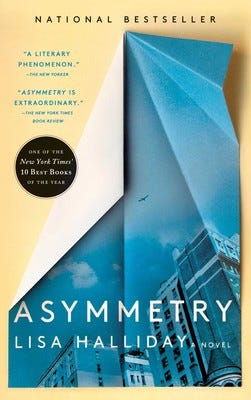
Ed. note: I'm just getting started here, and I'm open to ideas. Let me know how I can do better.
If my emotions over the course of this week were illustrated, it would probably look a lot like steep triangles on a line graph or a swirling vortex of doom — just all over the place. I got weird news, and then I got weird. I did my best to immerse myself in books, movies and TV, in an effort to distract from ‘real life,’ but I was too distracted for the most part. I would start a podcast, then realize 30 minutes later that I had not actually listened to any of it. Luckily, there were a couple of days of good weather and errands to do, so I could roll my car windows down and crank the Descendents, and that is not therapy, but it does feel good.
Please share your windows-down, not-therapy music with me. I think it will be needed in the coming weeks.

Asymmetry by Lisa Halliday
If you purchase a book through an affiliate link, I may make a small commission.
Lisa Halliday reaches into your mind and turns whatever you were thinking about 45 degrees, illuminating different dimensions of ideas. The novel is split into two stories told by different characters. Each has a distinct mood and texture, while still blending together beautifully and unexpectedly.
From the publisher:
The first section, “Folly,” tells the story of Alice, a young American editor, and her relationship with the famous and much older writer Ezra Blazer. A tender and exquisite account of an unexpected romance that takes place in New York during the early years of the Iraq War, “Folly” also suggests an aspiring novelist’s coming-of-age. By contrast, “Madness” is narrated by Amar, an Iraqi-American man who, on his way to visit his brother in Kurdistan, is detained by immigration officers and spends the last weekend of 2008 in a holding room in Heathrow. These two seemingly disparate stories gain resonance as their perspectives interact and overlap, with yet new implications for their relationship revealed in an unexpected coda.
SO much has been said about this book. I thought it was wonderful, but I also think that if I were to try to write about its literary merit, it would be a lot like a kid trying on her mom’s heels and stomping around the living room. You can read some reviews by people who know what they’re doing.
But I am very interested in some ideas the story provokes about who can write about what. Through her characters, Halliday explores the power imbalances, and how people’s perceptions of others create notions and distortions. We imagine and discern someone as different from ourselves. Then we try to reconcile those differences through language and empathy.
I was reminded of American Dirt and the recent controversy surrounding it (I haven’t and probably won’t read American Dirt, I am just aware of the fallout). Myriam Chingona Gurba de Serrano’s essay examines what critics find problematic and unsuccessful about the book: “Cummins plops overly-ripe Mexican stereotypes, among them the Latin lover, the suffering mother, and the stoic manchild, into her wannabe realist prose.” Another writer succinctly concluded that the problem with American Dirt isn’t who wrote it, but how it’s written. At any rate, it reignited important conversations about who should write about who. Probably because I am a privileged white lady, I am interested in this idea of empathy and straying from the ‘write what you know’ dictum, about who can write about someone with a very different lived experience.
I think, perhaps, the reason Halliday was successful where Cummins wasn’t — at least in the eyes of critics — is that she writes about experiences she won’t face, but does so acknowledging there’s so much she doesn’t know. A passage that has stuck with me after finishing the book is:
There's an old saying, he said, about how the foreign journalist who travels to the Middle East and stays a week goes home and writes a book in which he presents a pat solution to all of its problems. If he stays a month, he writes a magazine or a newspaper article filled with 'ifs,' 'buts,' and 'on the other hands.' If he stays a year, he writes nothing at all (pg 197)
Halliday’s narrator doesn’t slip into caricature or have the uniquely white-lady-naivete that the narrator of American Dirt is accused of having. Amar isn’t flattened, doesn’t exist only to show that RACISM IS BAD. He’s someone with dimensions and qualities other than, but not outside of, his race. She works to imagine and discover as someone whose lived experience is far different from her own. She illuminates the ways one character is very similar to the other, that they’re not very different. But at the end of the day, she is writing about someone who is not all that different because she created them. She still has not lived the experience.
So what does this mean? To be self-aware while also empathizing? Are those ideas at odds? I don’t think so, because I think that some of the best writing can be both familiar and revealing, can shift the world as we see it and how we see ourselves. At the same time, I mistrust my own experiences, so I’m more than hesitant to imagine someone else’s.

Set My Heart On Fire Immediately by Perfume Genius
I can’t believe I didn’t anticipate how hard I would fall for this album. I want to wrap the music around myself like a blanket, and nestle up into it for hours.
I love Mike Hadreas’ other albums, and Set My Heart On Fire Immediately feels both unexpected/fresh and like a logical evolution from previous work. Hadreas is not afraid to marinate in feelings and let them tear him up Alien-style. The lyrics on their own, in less skilled hands, could be a little too earnest, a little trite. I mean, the words “set my heart on fire immediately” are about as subtle as crying in a high school bathroom stall. But when Hadreas sings, I am hypnotized. The different ways he uses his gorgeous voice — falsetto, then monkish chanting, then soulful crooning — feel like he’s inhabiting characters in different parts of production — Juliet before and Juliet after. I think all of his music has a cinematic quality (maybe I think this just because of Eighth Grade?), and this album especially feels like I’m seeing and experiencing an unfolding love story and quarter-life crisis and coming-of-age tale, his or mine.
The first time I heard “Describe” — a track that features grungy guitar fuzz before morphing into soothing, celestial ambiance that I could float through for years — I put my fingers on my temples and closed my eyes, and just let the track wash over me. It’s a plea to experience what someone else is experiencing, to grab ahold of love as someone else experiences it. What Hadreas is communicating here is familiar, but not cliche. It isn’t overly dramatic, it’s just right.

Ballet Statique by Conrad Schnitzler
Something I’ve heard a lot of lately in many different contexts is “I can’t focus,” (one person I’ve heard it from is myself, to myself). I think that’s more than okay and understandable given the circumstances. But when I need to Get Shit Done — like do important research, file my taxes, or even write in my notebook — something about Ballet Statique perfectly focuses my mind. I owe several met deadlines to this album. The ambient tracks are perfectly calibrated to help me focus my mind without falling into a white noise-induced burnout. I think ambient music must be so difficult to get right: how do you create something special that’s intended for a background? You want wallpaper that isn’t too busy or depressingly dull, but that suits the space. Ballet Statique is beautiful music that can stand on its own with headphones and a long walk, but it can also be perfect wallpaper when you need to be in the room without focusing on the room.

Thanks for reading! See you later.



C. Troutman ALWAYS on brand with the literary recommendations. 💗 I am, perhaps, like you, that authors and creators must use their empathy to branch out and grow as artists, while also being self-aware about their ignorance. I would love to hear your thoughts about identity politics for playwriting sometime, there’s an intersecting dimension of on-stage representation that goes hand-in-hand with the playwright’s storytelling that would be interesting to explore.
P.S. Hayley William’s “Petals for Armor” came out about two weeks ago and NEWS FLASH, it is more organic and heartfelt than anything she did with Paramore.